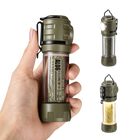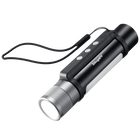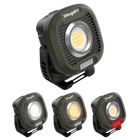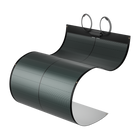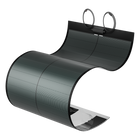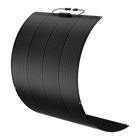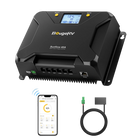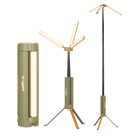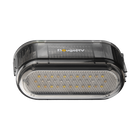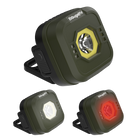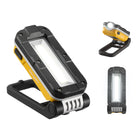How Much Solar Power Do I Need For My RV?


Were you planning to embark on unforgettable adventures with your RV? Ensuring a reliable and sustainable power source is vital for a comfortable journey. Solar power offers an eco-friendly and cost-effective solution, allowing you to enjoy the freedom of the open road without worrying about battery life or limited electrical hookups.
Determining the optimal solar power capacity for your RV involves considering various factors, such as your power consumption needs, the duration of your trips, and the size of your RV. By finding the right balance, you can harness the sun's energy and enjoy a self-sufficient and sustainable power supply on your travels.
In this article guide, we'll explore the key considerations to help you calculate your RV's ideal solar power requirements. From understanding your energy needs to assessing solar panel capacity, we'll equip you with the knowledge to make informed decisions and maximize your RV's solar potential.
Let's get started on your journey to efficient and independent power.
How Much Power Do I Need For RV?
To accurately determine your daily energy usage, it is important to calculate the amount of power consumed throughout the day. In order to achieve this, there are a few methods you can employ. Let's explore these methods further.
RV Battery Storage
Determining your daily energy consumption involves assessing the charge level of your battery. It is crucial to avoid discharging your lead acid battery below 50% to prevent damage and extend its lifespan.
Monitoring your battery may seem straightforward, but standard RV battery voltmeters provide limited useful information. These devices display numbers like "12.6" or "12.3," which are not informative unless you understand their meaning.
Generally, a fully charged RV battery registers around 12.6+ volts, while a battery at 50% charge ranges between 12.06-12.10 volts on average. If your voltmeter shows a number below this range, immediate charging is necessary.
If you plan on frequently camping, investing in a reliable battery monitor or gauge is advisable, especially if your RV is not equipped with one. Ideally, look for a system that offers a simple charge percentage indication. It is much easier to interpret a monitor displaying an 80% battery level than trying to decipher the significance of 12.4 volts on a voltmeter.
Once you accurately assess the remaining power in your RV, you can utilize this information to calculate your daily energy consumption using either of the three methods below.
Use BougeRV Solar Calculator
For those seeking a convenient method to assess their RV's power requirements, the BougeRV Solar Calculator is an invaluable resource. This user-friendly online tool eliminates the complexities of manual calculations and saves time, enabling campers to prioritize their camping experience.
By providing input on your RV's appliances, usage patterns, and battery capacity, the solar calculator generates personalized recommendations for the optimal solar kit that precisely matches your unique needs.
Calculate By Yourself (Unrecommend)

While the BougeRV Solar Calculator offers convenience, some prefer a more hands-on approach. If you're up for the challenge and wish to estimate your power consumption manually, you can follow these steps:
-
Assess your daily power usage: Create a comprehensive list of all the appliances and devices you typically use in your RV. This includes lights, refrigerators, air conditioning units, TVs, microwaves, and other electronics. Consult the device's user manuals or labels to determine their power consumption in watts (W) or amps (A).
-
Calculate daily energy consumption: Multiply each appliance's power consumption (in watts) by the number of hours you use it daily. Add up these values to obtain your total daily energy consumption in watt-hours (Wh).
-
Account for inefficiencies: Keep in mind that some appliances, such as refrigerators, operate intermittently rather than continuously. To account for this, estimate each device's average daily usage time and adjust your calculations accordingly.
-
Consider battery efficiency and autonomy: RV batteries are not 100% efficient in storing and discharging energy. It's crucial to factor in the efficiency rating of your battery system, typically expressed as a percentage. Additionally, determine the desired autonomy level, which refers to the number of days you want your battery to provide power without recharging.
-
Calculate total energy storage required: Multiply your daily energy consumption (in watt-hours) by the desired autonomy level and divide it by the battery efficiency percentage. This will give you an estimate of the total energy storage capacity required for your RV.
-
Determine solar panel capacity: Consider the solar panel's charging capacity once you have your energy storage requirement. Solar panels generate electricity based on their wattage rating. Divide your total energy storage requirement by the number of sun hours available in your camping location to determine the minimum solar panel wattage needed.
Go Camping And Figure It Out
One highly effective method to gauge your energy output during camping trips is to immerse yourself in the experience. Settle into the boondocks for a few days and utilize your RV as you typically would—without additional power conservation measures or generator usage. This approach allows you to obtain realistic data about your power consumption.
Here's a step-by-step process to calculate your power needs based on real-life camping experiences:
-
Camp normally without consciously conserving power or relying on a generator.
-
Utilize a voltmeter or battery monitor to monitor your battery level.
-
After two days of camping, observe that your 200 amp-hour lead-acid batteries are at 50%.
-
Calculate your average daily power consumption. In this scenario, you used 100 amp-hours in two days, averaging to 50 amp-hours per day.
Battery Usage Calculation:
|
Camping Duration |
Battery Level at the End |
Amp-Hours Used |
|
2 days |
50% |
100 |
Following this process, you can obtain valuable insights into your typical power requirements and make informed decisions when designing your solar power system for optimal performance.
How Many Solar Panels Do I Need For RV?
Determining the ideal number of solar panels for camping involves understanding solar power functionality and daily power requirements. To address this crucial question, we must first explore the power output of a single solar panel, which varies based on several factors.
For an alternative to our exceptional solar calculator, we offer insightful information below on a suggested kit and typical battery needs, serving as an excellent starting point for your camping adventure.
BougeRV Solar Panels For RV
At BougeRV, we offer a range of 100W and 200W 12V solar panels designed specifically for RVs. Our new flexible solar panels feature cutting-edge CIGS technology (Copper Indium Gallium Selenide).
These lightweight panels can be easily installed using the included adhesive, conforming to multiple surfaces of your RV. Additionally, their bendable nature allows for convenient storage by rolling them up, making them highly portable.

BougeRV also provides 9BB monocrystalline solar panels, which are ideal for permanent installations. These panels offer excellent efficiency and durability, ensuring long-term power generation for your RV.

By offering flexible CIGS panels and Monocrystalline panels, we cater to different RV setups and preferences, providing versatile options to meet your needs.
Solar Panel Efficiency
Solar panels are rated for maximum efficiency, representing the power output under perfect conditions. However, it's important to remember that real-world conditions are rarely ideal.
Factors like shading, temperature, and panel orientation can impact panel performance. While BougeRV solar panels are designed to provide optimal efficiency, it's crucial to consider these factors when estimating power generation.
You Can Estimate The RV Solar Panel Needs
Determining the exact output of a solar panel is subject to various factors, resulting in potential variations. However, a few helpful tips give you an approximate estimation.
As a general guideline, a 200-watt solar panel typically generates around 50 amp-hours per day. This information can be a reference point when calculating the number of panels required for your specific needs.
Another valuable method is to align your battery's amp-hour capacity with the wattage of your solar output. For example, if you have a 200 amp-hour camper battery, it would be advisable to have approximately 200 watts of solar power. Additionally, it is essential to consider that solar panels experience a decrease in efficiency ranging from 75% to 90% on cloudy days.
Consequently, it is recommended to have a slightly higher solar power capacity than strictly necessary, typically around 20% more, to account for suboptimal conditions.
Do The Math To Identify How Many Solar Panels You Need
Determining the Number of BougeRV Solar Panels for Your RV: To help you with the number of BougeRV solar panels you require for your RV, let's consider this example:
Example RV Specifications:
-
Power Consumption: 50 amp-hours per day (from the above calculation)
-
Average Daily Sunlight: 6 hours
-
Solar Panel Specifications: BougeRV 200W flexible CIGS solar panel range form 8.02-8.4 amp.
-
Based on these specifications, we can calculate the number of panels required using the following formula:
So, BougerRV flexible CIGS solar panel – 200W range from 8.02-8.4 amp. Therefore, 8.4 amps x 6 hours = 50.4 amp hours.
The calculation of 8 amps multiplied by 6 hours results in 50.4 amp-hours, so BougeRV 200W flexible CIGS solar panels effectively fullfill the estimated requirement of 50 amp-hours. This amount adequately satisfies the daily necessity and provides, it is advisable to incorporate an oversizing factor in your solar array to provide a safety margin
Depending on your reliance on solar power as the sole energy source, it is recommended to include an additional capacity of 20-25 percent above your specific needs. This precautionary measure ensures that you do not encounter a shortfall on a cloudy day or in the event of unexpected higher energy consumption.
Recommended Number of BougeRV Solar Panels for Your RV Based on the Above Calculation:
|
Solar Panel Type |
Number of Panels Required |
|---|---|
|
BougeRV Flexible CIGS Solar Panel (200W) |
1 panel |
|
BougeRV Flexible CIGS Solar Panel (100W) |
2 panel |
RV Solar Disclaimer
While estimating your solar panel needs can provide a starting point, it's important to note that individual RV setups and energy requirements may vary. Factors such as location, climate, and personal preferences can influence the number of solar panels needed.
Consulting with solar experts or professionals in the RV industry can provide valuable insights tailored to your specific needs.
Conclusion
Determining the appropriate amount of solar power for your RV is crucial for a self-sufficient and sustainable travel experience. By understanding your daily power requirements, evaluating the power output of solar panels, and considering factors like location and energy consumption, as mentioned above, you can make an informed decision.
Remember to leverage tools like our solar calculators or expert advice to optimize your RV's solar power system if you still need clarification on it, ensuring a reliable and eco-friendly energy source on your adventures.
FAQs
1. Can you run an RV completely on solar power?
Yes, it is likely to run an RV completely on solar power. By installing a properly sized solar power system, including solar panels, a charge controller, a battery bank, and an inverter, you can generate and store enough electricity to meet your RV's power needs.
However, the feasibility of running an RV solely on solar power depends on factors such as energy consumption, available sunlight, and the size and efficiency of the solar setup.
2. How much solar do I need for a 30-amp RV?
According to general guidelines, a solar panel with a power output of 100 watts can provide your battery system with approximately 30 amp-hours of charge per day.
Therefore, to meet your solar power requirements, you would need either 2 solar panels with a power output of 100 watts each or a single solar panel with a power output of 133 watts:










